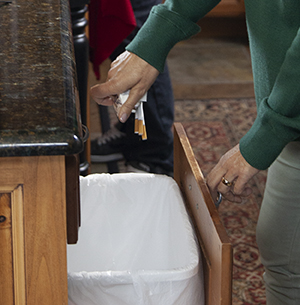Breastfeeding and Tobacco Use
Breastfeeding is one of the healthiest things you can do for your baby, even if you smoke. But using tobacco products or e-cigarettes is harmful to your baby. Here’s what you should know.
How tobacco hurts your baby
Nicotine and other harmful chemicals are found in tobacco products such as cigarettes, chewing tobacco, pipe tobacco, waterpipes (hookahs), and cigars. When you use tobacco, the chemicals in these products are passed to your baby through your breastmilk and secondhand smoke. The more tobacco you use, the higher the level of nicotine in your breastmilk. Nicotine can cause symptoms in your baby such as:
-
Not sleeping as long
-
Faster heartbeat
-
Restlessness
Smoking while breastfeeding has also been linked to:
-
Reduced breastmilk supply
-
Lower weight gain for babies
-
Breastfeeding for a shorter length of time
-
Trouble breastfeeding
-
Colic
-
SIDS (sudden infant death syndrome)
Secondhand smoke
In addition, when you smoke, you are exposing your baby to harmful secondhand smoke. This exposure can raise your baby’s risk of health conditions such as:
-
Asthma
-
Allergies
-
Ear infections
-
Bronchitis
-
Pneumonia
-
Impaired lung function
-
SIDS
E-cigarettes and your baby
E-cigarettes (also called vapes) are battery-powered devices that make a vapor (aerosol) that most often contains nicotine. It may also contain harmful substances that cause cancer. These harmful substances can enter the body when you breathe in the aerosols produced by e-cigarettes.
Experts don’t fully know the effects of a breastfeeding mother’s e-cigarette use on a baby’s health. But e-cigarettes are unsafe for pregnant women, kids, teens, and young adults. The safest thing for your baby is to not use e-cigarettes while breastfeeding.
What you can do
The best thing for your baby’s health is to stop using tobacco products or e-cigarettes while breastfeeding. But if you do smoke, or are trying to quit, don’t stop nursing. Breastfeeding has many important health benefits for you and your baby. So it’s better to keep nursing, even if you do smoke. Follow the advice below to stop using tobacco, or at least reduce the amount you use and limit your baby’s exposure.
Quit smoking

If you use tobacco or e-cigarettes, quit. This is the best thing you can do for your baby’s health. Talk with your healthcare provider about quit-smoking programs and safe options to help you get started. These include:
-
Smoking cessation aids. There are many products available to help you quit, including nicotine gum and lozenges, and nicotine patches. Talk with your healthcare provider about these options and how to use these safely when breastfeeding.
-
Smokefree resources. Find helpful quitting tips and tools here. These include a text messaging program for 24-hour support, apps, and information on making your own quit-smoking plan.
-
Quit-smoking hotline. Call 800-QUIT-NOW (800-784-8669) to be connected to your state’s hotline and speak with a counselor about quitting.
Limit your baby's exposure
If you can’t quit right away, take steps to reduce your baby’s exposure to cigarette smoke:
-
Reduce how much you smoke or vape. This is good for your baby and you.
-
Nurse your baby before you smoke or vape, not after. This way your body will have more time to reduce the level of nicotine in your breastmilk. It takes about 1.5 hours after smoking for the nicotine level in your breastmilk to drop by 50%.
-
Don’t smoke when you breastfeed or hold your baby. Change your shirt and wash your hands and face after smoking or vaping before feeding or holding your baby.
-
Keep your home and car smoke-free so your baby isn’t around secondhand smoke. Smoke or vape outside.
-
Don’t let anyone smoke or vape around your baby.
-
Have anyone who smokes or vapes change clothes and wash their hands before touching your baby.